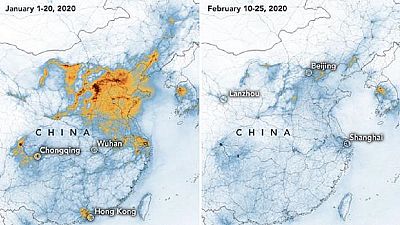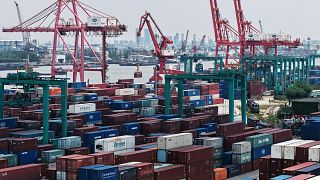China
China’s far-reaching efforts to control the spread of the new coronavirus have shuttered factories, emptied airports and resulted in a steep drop in carbon emissions and other pollutants.
Pollution monitoring satellites have detected significant decreases in nitrogen dioxide over China. There is evidence that the change is at least partly related to the economic slowdown following the outbreak of coronavirus. Learn more from
— NASA (NASA) March 1, 2020NASAEarth: https://t.co/2N9GB8hfnB
“So right now we’re seeing drops in both carbon emissions as well as nitrogen dioxide. Carbon emissions are down by about 25%, nitrogen dioxide is down by about 30%,” said John Helveston, professor at George Washington University’s School of Engineering & Applied Science.
However, analysts caution that the dip in pollution is likely temporary.
“The thing I’m mostly concerned about is a potential rebound effect, which we’ve seen in the past. After the 2008 financial crisis, for example, the government had introduced a lot of spending stimulus packages to stimulate the economy and that actually lead to an increase in emissions that was potentially more than what would otherwise have happened if we didn’t have the financial crisis,” Helveston said.
NASA and the European Space Agency say their pollution monitoring satellites over China detected big drops since January in nitrogen dioxide, typically produced by motor vehicles, power plants and factories.
“There is evidence that the change is at least partly related to the economic slowdown following the outbreak of coronavirus,” NASA said in a statement.
The drop in nitrogen dioxide was first detected around the epicenter of Wuhan, then spread across the country, NASA said.
Nationwide, the level of nitrogen dioxide was down 42%, and the level of PM2.5 — tiny particle pollution that can penetrate lungs and other organs — was down 27%, according to government monitoring stations.
Beijing residents weren’t so lucky.
The capital’s smog, as measured by PM2.5 levels, was worse this February than the same month last year. Steel plants in regions near Beijing did not shut down, according to an industry analysis done by analysts at the Centre for Research on Energy and Clean Air in Helsinki.
Since January, China has imposed wide-ranging travel bans, placed around 70 million people under virtual quarantine and urged those who can to work from home.














02:19
Morocco sees surge in Chinese tourists
01:22
World will have to learn to live with heatwaves, UN says
Go to video
China, Egypt FMs discuss Middle East escalation in phone call
Go to video
UK bans South Africa’s Julius Malema over Hamas support, violent rhetoric
01:47
Chinese city of Xuchang is world's biggest producer of wigs
01:00
US president Trump renews extension for TikTok to avoid nationwide ban